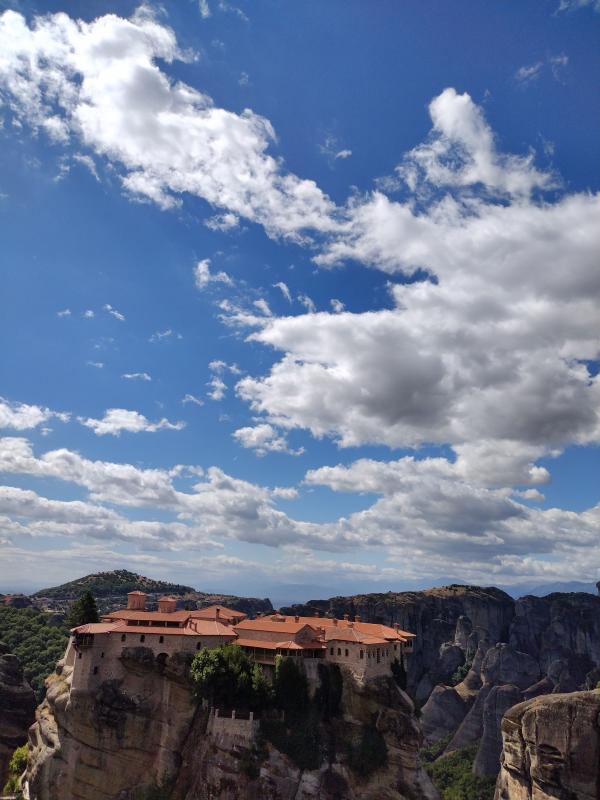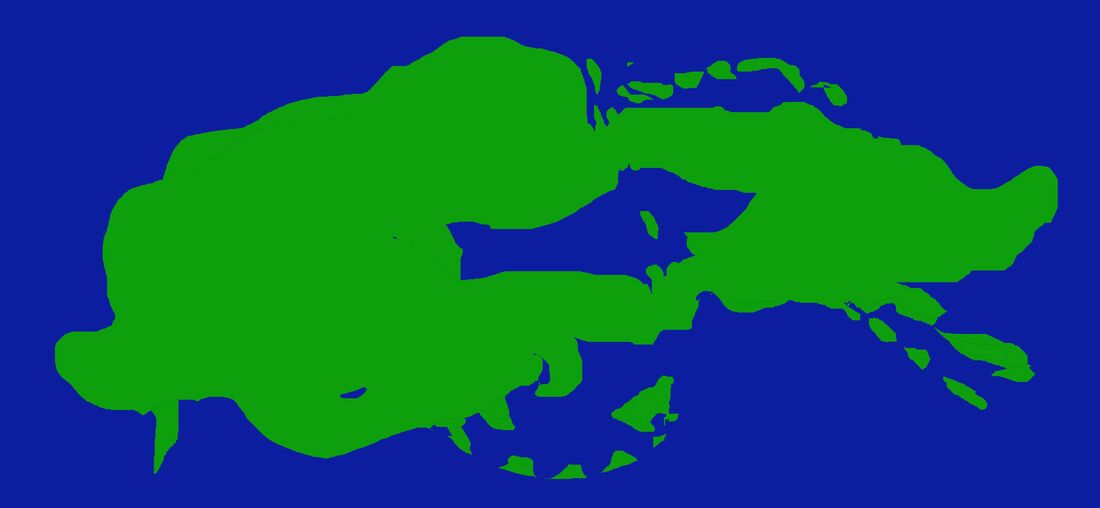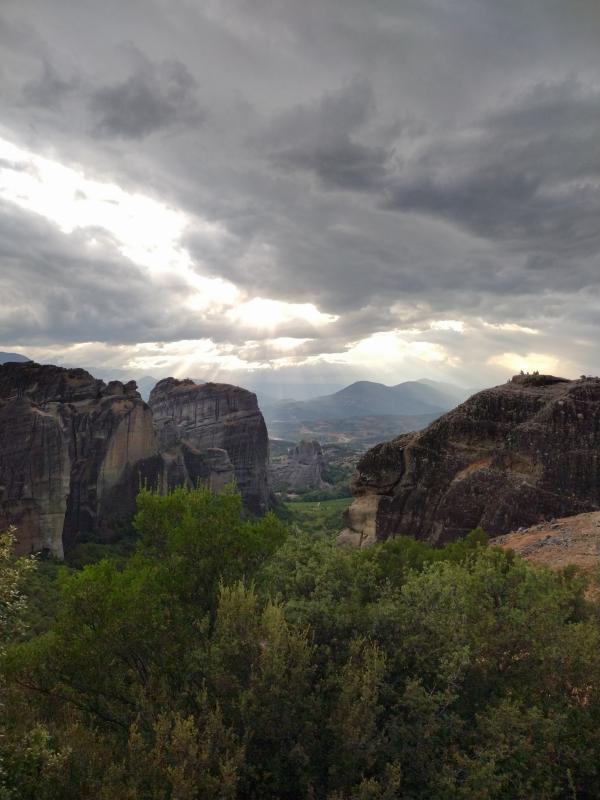|
So there we were, having a great idea. Pavlina and I were home in Sofia for three days without the kids so we could get some work done. I'd spent the day editing The World's Other Side, working out, and walking to the wrong part of the city to pick up Pavlina. A Ragusea chicken salad for dinner, a glass of cold white wine, and the stage was set for a Zoom call with Simon. Simon Roy is a comic book creator, colleague, and example of the kind of independent creator I want to be. He's also one of my most inspiring friends; ideas seem to shape themselves in the air between us. In this case, we were talking about collaborating with people of strong political opinion ("if they're willing to play, go for it") and the censorious, overheated state of the American conversation in general. Simon reminded me of a comparison I'd made once to a divorce: the Democrats got science and the Republicans got family. And I was like, hey. What if there was a divorce between the gods? The Sky Father and the Earth Mother are separating, and their children — us humans — have to choose whose house we'll go live in. Simon is like, "yeah, but what about characters?" At the time, I had nothing but a vague "…Napoleon?" That's because I was thinking about Europe: a History, by Norman Davies, who describes the opposing conceptions of the left/right political spectrum as the tug-of-war ("we can have no peace until our enemies are defeated!") and the tether ("we can have peace only as long as the center holds."). What if the center does not hold? The next morning, I drew feverish maps of a continent with a large lake at its center. A lake with a tectonic rift forming down the middle. On Saturday, speeding past the downcast faces of the August sunflowers on our way back to the village, I related the story of some dumb Twitter scandal I'd heard about on Razib Khan's Unsupervised Learning Podcast. Pavlina the IT entrepreneur was contemptuous. Don't those idiots know the algorithms they care so much about were written by some programmer after three cups of coffee and an aggravating Microsoft Teams meeting? They're doing what the architecture of the space they're in induces them to do.
I said, "Yes and." Think about the court of Louis XIV. All those cutting remarks and ruined reputations, the fans fluttering before hard eyes, the lives made and lost within rooms, alcoves, and gardens that some person had designed for that purpose. Imagine the architect of the the Palace of Versailles, watching as the court comes apart. We were just passing out of Pernik. The road was squeezed between a pair of mountains, one crowned by a reconstructed fortress. "You're not going to like this," I said. Pavlina's parents divorced when she was in her 20s. "There's this woman. She's standing on the balcony of the palace she designed, and she's watching a volcano erupting into the middle of a thunderhead. Flying boulders, oozing lava. Lightning crashes from the ash that spews into the heart of the squatting storm. "And she says, 'I can't stand it. I hate seeing them fight like this.'" Pavlina's like, "Oh. No, I don't like it. You have to write it." So here we are. Five thousand years ago! Five thousand years ago, the gods of two continents fell in love and smashed their lands together. Now, they are separating. Prodigies lead revolts against angels. Demigods turn their divine gifts against each other. The old Order is on the brink of collapse, and the new Council thirsts for revenge. Some choose sides, but most people just want to know what sacrifices to make so that the gods stop fighting. Architect Nora Soler Harqne s'Aqrasak is interested in floating gardens. She knows sacrifices are pointless, and she's had it with both gods. Together with a mason who should be her enemy, she plans to build a third realm. (I should also mention the life story of Zaha Hadid, the inspiring-by-how-mediocre-it-is Against the Light by Dave Duncan and the inspiring-by-how-good-it-is Mira Nair's A Suitable Boy on Netflix. They're in the list of ingredients as well.) I'm not famous enough for anyone to ask me where my ideas come from, but if anyone does, see the above. I'm reading a lot, listening a lot, talking to lots of different kinds of people, and feeling my big feelings. I don't say, "I'm going to write a parable of our times," or even, "man, if I could do what the Strugatsky Brothers did…" Instead, I notice when a feeling climbs an idea, and what other ideas buttress it. If it all seems to self-assemble like a bunch of magnets, and the result scares me, I know I have to write it. If my wife tells me "you have to write it," that helps. I already have a playlist. *** In other news, I have finished editing The World's Other Side. I sent the cleaned-up draft to Georgi Shopov, my editor. I have a sketch from Stefan Tosheff the cover-artist. We're on track to start serializing this alternate history story on Royal Road at the beginning of October and Patreon at the end of September. Expect more news soon. *** And I read some things: Calde of the Long Sun by Gene Wolfe This is a book that rewards close reading, as you can see from the following quote from page 2: "Without leaving his chair, he extracted the puff from a drawer on the other side of the room and applied flesh-toned powder delicately to the small, sharp chin he had shaped with such care upon arising." There's a point in the book where an old man separates his hands from each other, twisting one. I burst out laughing when I read that, and my kids asked me to tell them what was so funny. I realized the explanation would require them to read this book plus the two previous books in the Long Sun series. So, go do that. Against the Light by Dave Duncan I made a resolution at the start of the summer to spend less time listening to audiobooks. This book helped me do that. It was just barely interesting enough to keep me listening, but never for too long. There's a bit of world-building and events certainly follow one after another, but nothing ever transported me. I don't know if it's lack of editing or if Duncan just phoned this one in. Children of Chaos covers a lot of the same ground and it's a much better book. The Wailing Wind by Tony Hillerman Hillerman writes one scene where a lesser author would have written three. The result isn't frantic or even "gripping," it's efficient. We know what everyone's doing and we can focus on what's important, which is why they did it how they feel about it afterward ("why the hell was I such an idiot?"). I figured out the mystery exactly when Hillerman wanted me to. And it's sad. It's a sad, sweet story, and Hillerman tells it very well. I need to start the Joe Leaphorn books from the beginning. The Marquise of O— and Other Stories by Kleist von Heinrich I was set on these stories by Francine Prose, who raves about "The Marquise of O-" in her delightful "Reading Like a Writer." I have to confess I liked Prose's description of the story more than the original, but maybe that's just because I already knew the secrets. I hoped I'd enjoy the other stories more, but no. It's not just the 18th-century story-telling, or the way people just fly off the handle and set fire to Wittenberg, it's the finger-wagging moralization. Did you hear about the old woman who was told to stand up and move to the other side of a room? Well, she *died,* and her ghost haunted the bad young people who made her stand until they were so terrified that they burned down their whole castle, so there. These are the sort of stories my wife's grandma likes. Nowhither by John C. Wright It's half of a story. The first half. Our hero Ilya Muromets gets his ragtag band of rebels out of the clutches of the evil mulitverse-Sumerians and into apparent safety. Except, where are, like, half the ragtag band? More is going on than meets the eye, and Ilya must come to terms with the mistakes he made in book one in order to transform into the person who can solve the problems of book two. He resolves to do so...and the book ends. Book one (Somewhither) ended on an enormous cliffhanger, but it still felt like a complete and satisfying story. Nowhither doesn't. I like this series and I want it to be complete. I suppose I'll just have to wait. See you next month
0 Comments
Leave a Reply. |
AuthorDaniel M. Bensen Archives
March 2024
Categories
All
|




 RSS Feed
RSS Feed